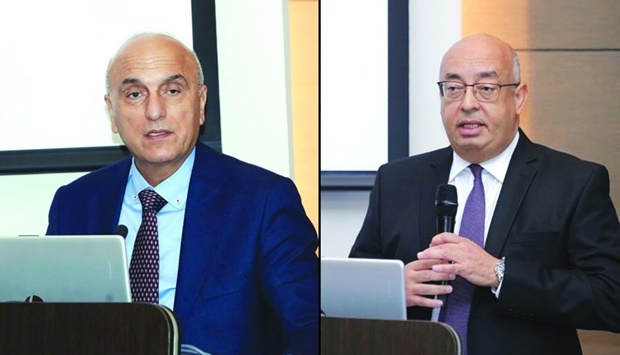The Ministry of Culture, in collaboration with the United Nations Educational, Scientific and Cultural Organisation (Unesco), organised on Sunday a training workshop and a panel discussion on the methods of preparing periodic reports under the 2003 convention concerning the safeguarding of the Intangible Cultural Heritage Convention in Qatar, QNA reported.
The event will continue until next Tuesday.
At the outset of the workshop, Director of Public Relations and Communication at the Ministry of Culture Aisha al-Mahmoud emphasised that the workshop discusses topics on Unesco and its conventions through training the ministry's professional cadres and the relevant authorities in Qatar on the methodology of preparing national periodic reports of Intangible Cultural Heritage Convention 2003, hailing the whole themes included in the agenda of the workshop ranging from topics to paragraphs that would essentially develop and enhance the capabilities of the working employees.
Unesco Representative for the Gulf States and Yemen and Director of Unesco Regional Office in Doha, Salah El Din Zaki Khaled clarified that the training process discusses the challenges and opportunities of preparing the reports under 2003 convention, findings-based monitoring and follow-up, methodologies of collating effective data, information sources and the participatory approach for reports preparation, emphasising that Qatar is a long-term partner for Unesco, specially with respect to the 2003 convention.
He elucidated that since the ratification of this convention in September 2008, numerous initiatives have been launched to promote the live heritage for local communities in Qatar, in addition to boosting transboundary co-operation in this field, just like the three elements included in Unesco's representative list of the Intangible Cultural Heritage of Humanity with the participation of Qatar as multi-national candidacies in collaboration with other countries. He stressed that Unesco highly prioritises the periodical reports under the convention with its entire cultural conventions, where the findings obtained through diverse reports preparation processes offer a real contribution to developing the policies in the field of culture and achieving sustainable development goals, noting that, after 19 years of the ratification of the 2003 convention, 180 countries remained parties to this convention which reflects the extent of the convention's response to appropriate and solid projections in this field, since the culture and the intangible cultural heritage in particular reverberate in the Gulf region in which cultural diversity, verbal traditions, celebratory events and traditional crafts remain at the core of societies and where heritage remains essential to solidify the social cohesiveness and to promote the values of solidarity and shared understanding among their people, he said.
Expert and certified trainer at Unesco Dr Hani Hayajneh talked about the Intangible Cultural Heritage Convention of 2003, including its goals that entail safeguarding the intangible cultural heritage, respecting the intangible heritage of the concerned groups and individuals, as well as the essential awareness at the local, national and international levels of the importance of intangible heritage, including the significance of the shared appreciation for this co-operation, and assistance.
He also pointed out Unesco's interest in the topic of safeguarding heritage.
The event will continue until next Tuesday.
At the outset of the workshop, Director of Public Relations and Communication at the Ministry of Culture Aisha al-Mahmoud emphasised that the workshop discusses topics on Unesco and its conventions through training the ministry's professional cadres and the relevant authorities in Qatar on the methodology of preparing national periodic reports of Intangible Cultural Heritage Convention 2003, hailing the whole themes included in the agenda of the workshop ranging from topics to paragraphs that would essentially develop and enhance the capabilities of the working employees.
Unesco Representative for the Gulf States and Yemen and Director of Unesco Regional Office in Doha, Salah El Din Zaki Khaled clarified that the training process discusses the challenges and opportunities of preparing the reports under 2003 convention, findings-based monitoring and follow-up, methodologies of collating effective data, information sources and the participatory approach for reports preparation, emphasising that Qatar is a long-term partner for Unesco, specially with respect to the 2003 convention.
He elucidated that since the ratification of this convention in September 2008, numerous initiatives have been launched to promote the live heritage for local communities in Qatar, in addition to boosting transboundary co-operation in this field, just like the three elements included in Unesco's representative list of the Intangible Cultural Heritage of Humanity with the participation of Qatar as multi-national candidacies in collaboration with other countries. He stressed that Unesco highly prioritises the periodical reports under the convention with its entire cultural conventions, where the findings obtained through diverse reports preparation processes offer a real contribution to developing the policies in the field of culture and achieving sustainable development goals, noting that, after 19 years of the ratification of the 2003 convention, 180 countries remained parties to this convention which reflects the extent of the convention's response to appropriate and solid projections in this field, since the culture and the intangible cultural heritage in particular reverberate in the Gulf region in which cultural diversity, verbal traditions, celebratory events and traditional crafts remain at the core of societies and where heritage remains essential to solidify the social cohesiveness and to promote the values of solidarity and shared understanding among their people, he said.
Expert and certified trainer at Unesco Dr Hani Hayajneh talked about the Intangible Cultural Heritage Convention of 2003, including its goals that entail safeguarding the intangible cultural heritage, respecting the intangible heritage of the concerned groups and individuals, as well as the essential awareness at the local, national and international levels of the importance of intangible heritage, including the significance of the shared appreciation for this co-operation, and assistance.
He also pointed out Unesco's interest in the topic of safeguarding heritage.

